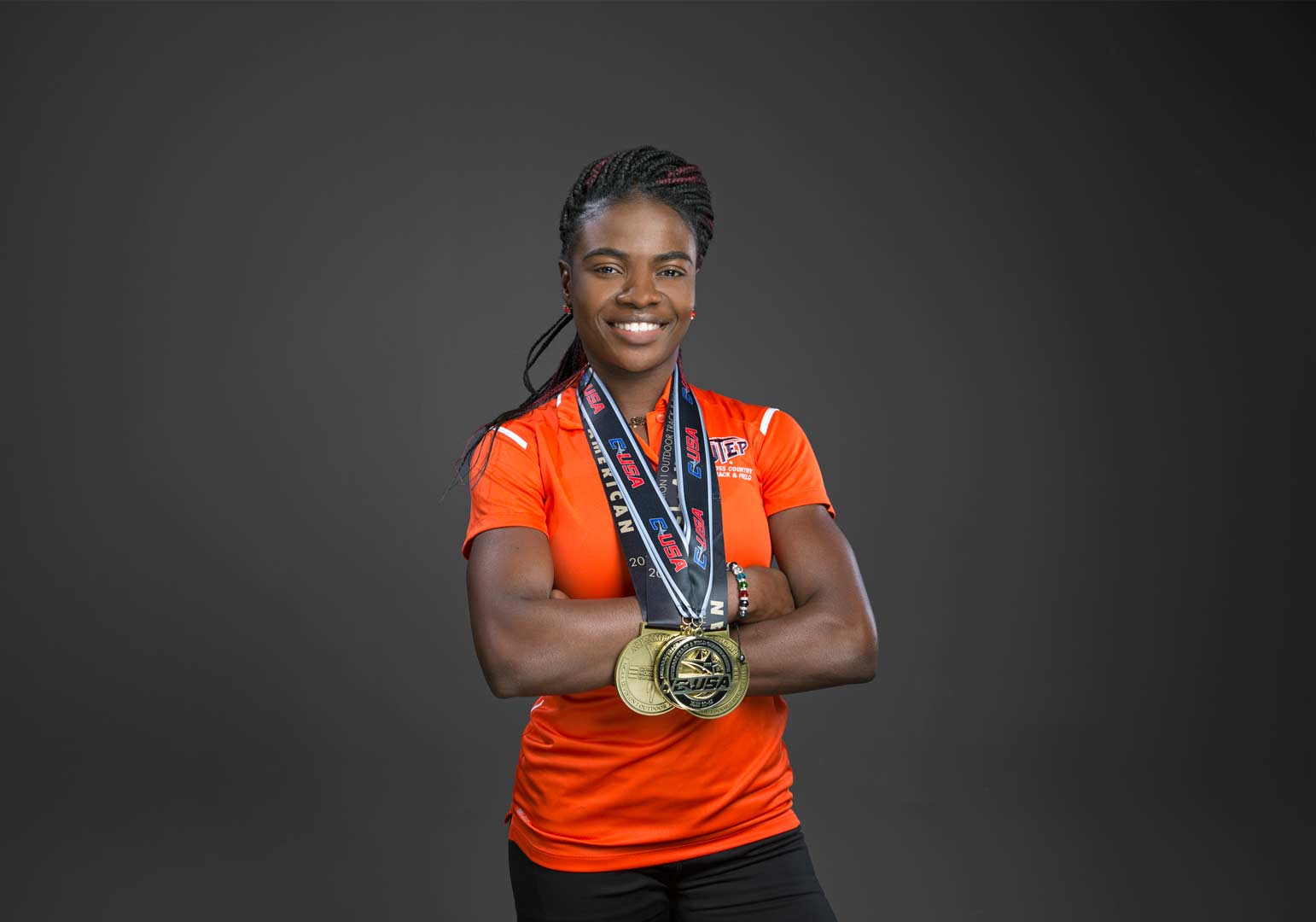Raise the Pick: Tobi Amusan
Last Updated on March 07, 2018 at 4:00 PM
Originally published March 07, 2018
By Leonard Martinez
UTEP Communications
Raise the Pick: This is the third article in a series about UTEP student-athletes who share their unique stories and how athletic scholarships have made a difference in their lives. Each of these students reflects on the value of their UTEP experiences and the opportunities they create for the future. Visit minerathleticclub.com to learn more about the Raise the Pick campaign.

Tobi Amusan.
Soccer may be the No. 1 sport in the world, but it just wasn't for Tobi Amusan.
"I used to be a soccer player back in high school," Amusan said. "And my coach used to tell me, 'This is where you're going to play (on the field).' But then I'm all over the place. After practice he told me, 'I told you to play right there. You were all over the place.'"
Amusan's coach knew there were track trials nearby and asked her how fast she could run.
"And I just went in there and defeated the fastest girl," Amusan said. That was the start of her track and field career.
With several Division I college athletic scholarships to consider, it came down to something very simple for Amusan.
"I felt like UTEP was like a home," Amusan said, noting that the University has enrolled other Nigerian students who have excelled on the track and field team.
In her short time on the team, Amusan made quite an impact. She completed her freshman season at UTEP in spring 2016 with a second-place showing in the 100-meter hurdles at the NCAA Championships with a wind-aided time of 12.79 seconds. She became only the second athlete for UTEP since it joined C-USA in 2006 to be named C-USA Female Track Athlete of the Year.
At the Conference USA Indoor Championships, Amusan finished with the third-best time in school history (8.23 seconds) to take gold. She also placed seventh in the long jump (5.84 meters) to earn two additional points. Her 12 total points helped the UTEP women's team claim its second consecutive C-USA title.
She also competed at the 2016 Rio de Janeiro Olympics in the 100-meter hurdles for Nigeria.
Mika Laaksonen, UTEP track and field head coach, said Amusan had not competed indoors before, but she got better with every competition.
"She is very talented," he said. "Little by little she worked her way up, trains very hard, is very dedicated and always comes to practice ready to compete. She knows you compete the way you practice."
Amusan is grateful to have found a family in the U.S. at UTEP.
"I want to thank UTEP for giving me the opportunity to come here in the States and study and then prove myself on the track, because without being here I might not know what I'm capable of doing," said Amusan, a health promotions major.
She added that education is really important to her because both of her parents are teachers back home in Nigeria.
"They believe education is the key to whatever you want to become in life," Amusan said. "Even though my parents were the ones pushing me to go to school, I had my own self-motivation. I know one day I'm going to stop track and field and my degree is going to speak for me. Life is not all about sport. It's going to end some day. Education is really important."
Track and field has taken Amusan around the globe, including to the Ukraine and Brazil. It also has resulted in surprise perks, such as being one of several African youth athletes to have dinner with the president of Nigeria in 2013. The pictures taken on her camera were lost long ago, but she still remembers the night vividly.
Amusan is no longer competing for UTEP after going pro a few months ago, but she is still taking courses at the University toward her degree and trains with her former UTEP coach with eyes toward qualifying for the next Olympics.
"How I'm preparing for it is the just the same mindset I had for 2016," Amusan said of the next Olympics. "So, it's just work harder times two because I know I made it to the semifinals in 2016. If I can make it to the semifinals in 2016 and I have four more years, then I feel I can, with hard work, prayer, and being injury free, do better in Tokyo 2020."